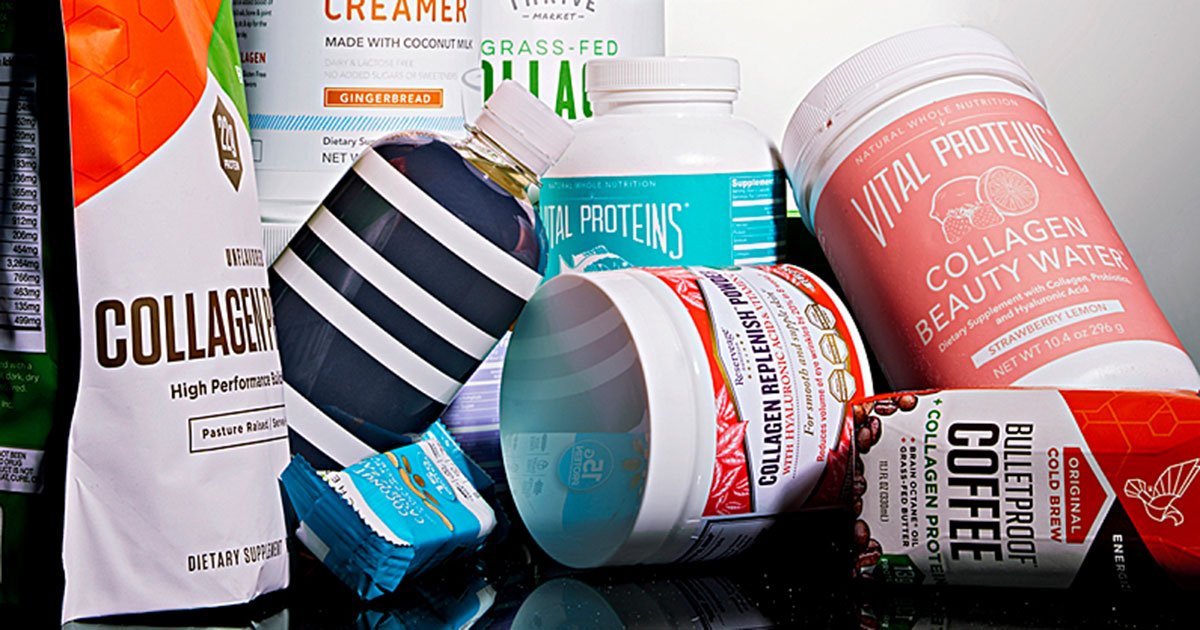
Photo: Ted Cavanaugh
Collagen supplements are taking the wellness world by storm. Once seen strictly as a skin plumper and smoother, it may have a whole range of health and fitness benefits, new research shows.
For one, collagen supplements seem to improve joint health. Athletes with exercise-related joint pain who took 10 grams of collagen daily had a reduction of their symptoms, a Penn State University study found.
The protein, which is naturally in your skin, tendons, cartilage, and connective tissue, may also help make you stronger and calmer. “Collagen contains the amino acids glycine and arginine, which help the production of creatine, a substance that enhances muscle strength,” says Mark Moyad, M.D., the author of The Supplement Handbook. Glycine seems to have a calming effect on the nervous system, which can improve sleep, Dr. Moyad says. And it blunts the body’s inflammatory response to stress, protecting the stomach lining from anxiety-induced damage. (Related: Why It’s Never Too Early to Start Protecting the Collagen In Your Skin.)
Since production of collagen slows in your 30s, bumping up your levels via collagen supplements could be a smart move. But where you get it and how much you take are important. Use this four-point plan to determine the best sources and amounts for you.
Add These Collagen Foods to Your Menu
“The best source of collagen is from whole foods,” says McKel Hill, R.D.N., the founder of Nutrition Stripped. If you’re eating a high-protein diet, you’re likely getting collagen, she says. All meat and fish contain it, but the things we rarely eat, like the tendons, offer the most. So if you’re trying to boost your levels, Dr. Moyad suggests bone broth, made by boiling those collagen-rich parts. Egg whites and gelatin (as Jell-O or mixed with milk and stirred into coffee) are good options too.
If you don’t eat meat, “opt for plant sources of proline and glycine, two of the main amino acids in collagen,” Dr. Moyad says. You can get them in legumes like soybeans; spirulina, an edible blue-green algae that can be added to smoothies; and agar, a substance derived from marine red algae that can replace gelatin in vegan desserts, he says. (Read more: What Is Powdered Collagen and How Do You Use It?)
Boost Your Collagen Absorption
Certain nutrients can kick-start the body’s production of natural collagen and maximize the effects of the collagen you get from foods or supplements. Dr. Moyad calls out three vital factors: vitamin C and iron, which are both essential for collagen production, and omega-3 fatty acids, which protect the body’s collagen stores from damage. You can easily get them from foods like bell peppers, broccoli, and citrus (for vitamin C); shellfish, red meat, and dark leafy greens (iron); and salmon, mackerel, and other oily fish (omega-3s).
Turn to Collagen Supplements
If you don’t eat much (or any) meat, you may want to consider collagen powder, protein, or—if you’re aiming for a higher dosage—pills, Dr. Moyad says. Look for a supplement that’s certified by a third-party quality-testing company, like NSF International or United States Pharmacopeia (USP). Start adding it to your diet slowly: First, take 1,000 milligrams for two to three weeks. If you notice perks—your joints feel better or you fall asleep faster—stick to that dosage. But if you don’t see any effects, go ahead and increase your intake in increments of 1,000 milligrams until you get results or hit 15,000 milligrams, whichever comes first, Dr. Moyad says. (Use collagen powder in this kiwi coconut smoothie bowl.)
Time Your Collagen Consumption Right
If you’re using collagen to step up your workout performance, consume collagen protein within an hour after exercise, just as you would with any other protein. People who did so improved their muscle strength and mass, according to research published in the British Journal of Nutrition. That timing appears to be critical because your muscles may be able to use collagen better to grow immediately after a workout, study author Denise Zdzieblik says. On the other hand, if busting hunger is your goal, take satiating collagen in the morning or afternoon, depending on when you tend to get hungriest, Dr. Moyad says. Supplementing your breakfast or lunch with a dose of collagen powder (stir it into a smoothie or even water—it’s tasteless) will help take the edge off cravings.
3 Easy Ways to Get More Collagen
- Collagen protein bars: With flavors like coconut cashew and macadamia sea salt, plus 15 grams of protein, Primal Kitchen collagen protein bars are a smart between-meal choice. ($18; primalkitchen.com)
- Collagen water: Dirty Lemon + collagen (infused with lemon juice and cayenne) delivers 4,000 milligrams of the protein—enough to give your levels a little bump anytime. ($65 for 6; dirtylemon.com)
- Collagen creamer: Stir a spoonful of coconut, vanilla, or gingerbread Vital Proteins collagen creamer—which contains 10 grams of collagen—into your morning coffee. ($29; vitalproteins.com)
[“Source-shape”]
